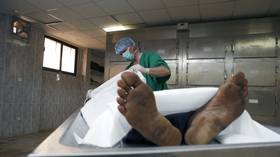Lady Lazarus: Indian woman declared dead TWICE by two different hospitals in bizarre case

In what has already been dubbed India’s first official case of the so-called ‘Lazarus effect,’ a 45-year-old woman was declared dead twice by two different city hospitals hours apart in a truly bizarre, if tragic case.
The woman suffered from chronic obstructive pulmonary disease, an inflammatory lung condition that severely impacts airflow. She was admitted to hospital for treatment, but was reportedly declared dead at the Government Multispeciality Hospital 16 in Chandigarh, and certified as medically deceased.
Her grieving family reportedly waited at the hospital for some three hours until an ambulance was free to take her remains to their home so they could prepare the woman’s funeral arrangements.
En route to the family home, however, her already distraught relatives saw that the woman’s remains were twitching, and they rushed to another hospital.
Sadly, after two hours of attempted emergency resuscitation, the woman was then declared officially deceased for the second time at the Emergency of the Government Medical College and Hospital, Chandigarh.
Also on rt.com Grieving father finds another newborn alive in shallow grave while burying his own daughter“In medical terms, this is called ‘Lazarus phenomena’ and worldwide only 38 such cases have been reported so far,” said Dr Dasari Harish, head of the hospital’s forensic department.
A committee was established to determine whether any form of malpractice had occurred throughout the episode, but no improprieties were uncovered.
Harish postulates that some “lifesaving drugs” administered to patients in crisis situations can have longer-lasting effects than previously thought, and may indeed revive patients temporarily after they have been officially declared dead.
Like this story? Share it with a friend!













